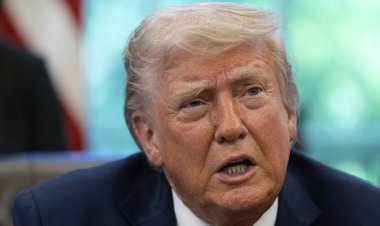GOP senators call on Supreme Court to 'update' ethics oversight
While Republicans at the Senate Judiciary Committee hearing focused on the high court's ethics mostly called it a partisan spectacle, some acknowledged justices needed to take action.


Partisan cannon fire dominated Senate Democrats’ high-profile hearing Tuesday on Supreme Court ethics, but behind the bluster, some Republicans acknowledged the high court needed to address a spate of controversies about justices’ conduct.
The Senate Judiciary Committee hosted the hearing to call for more formal ethical standards at the high court. Chair Dick Durbin opened the session by recounting recent reports that Justice Clarence Thomas accepted luxury travel via private jet and yacht from a Texas developer without declaring most of the hospitality on his financial disclosures and sold his mother’s home to the same developer without reporting the transaction.
And while Republicans mostly came to Thomas’ defense, dismissing the hearing as a partisan spectacle aimed at the conservative majority, senior GOP senators also advised the court to provide more transparency and a move toward a better defined process to apply their ethical standards.
“What I would urge the court to do is take this moment to instill more public confidence,” said South Carolina Sen. Lindsey Graham, top Republican on the Senate Judiciary Committee.
“It does appear there needs to be better oversight,” said Sen. Chuck Grassley of Iowa, a previous chair of the panel, even as he dismissed the hearing as “political theater” and “relentless political battering.”
“I think that they could update, refresh and address the concerns without requiring any Congressional action,” said Sen. Thom Tillis (R-N.C.), adding that he hoped the hearing had been “instructive” to the high court.
The hearing mostly illustrated the existing battle lines between the parties, with Democrats blasting the high court as bypassing common-sense standards. Chief Justice John Roberts had declined Durbin’s invitation to attend the hearing, clearly riling the chair.
“How low can the court go?” Durbin asked, after listing various media reports that called justices’ conduct into question. “This is not the ordinary course of business. … We wouldn’t tolerate this from a city council member or an alderman. It falls short of ethical standards we expect of any public servant in America and, yet, the Supreme Court won’t even acknowledge it’s a problem.”
But the hearing also amounted to a tacit admission from Durbin and Senate Democrats: Their best shot at getting justices to address simmering ethics concerns is to step up public pressure, given the tough environment for passing any legislation.
Lawmakers have introduced a series of bills aimed at increasing ethics safeguards and transparency at the high court. But any legislation faces widespread skepticism from Republicans. Any Supreme Court ethics bill would likely require 60 votes in the Senate, and thus GOP support, not to mention virtually no chance at passage in the Republican-controlled House.
And GOP senators made it clear Tuesday that Democrats’ efforts to pass legislation on the topic would be one-sided.
Graham said that his party “will push back as hard as we can” against what he called transparent attempts by Democrats to retaliate against the court for recent decisions driven by its conservative majority.
“This is an unseemly effort by the Democratic left to destroy the legitimacy of the Roberts court,” Graham declared. “There’s a very selective outrage here.”
Graham also accused Justice Ruth Bader Ginsburg, a liberal icon who died in 2020, of ethical breaches and said her actions were largely ignored by the mainstream press.
“When a liberal justice does something, the reaction in the American media is completely different,” Graham complained.
Sen. Chris Coons (D-Del.) noted that, despite the political fireworks Tuesday, increasing transparency around judges’ personal financial dealings has not been a partisan issue in recent years. Just last year, a law requiring judges to disclose stock trades within 45 days passed on voice votes in both the House and Senate.
Congress stepping in to enforce ethical guidelines on the Supreme Court raises separation-of-powers questions, but witnesses were split on party lines on whether the legislative branch could constitutionally pass such a measure. Witnesses invited by Democrats to the hearing said Congress has broad authority to regulate ethics at the high court, while those invited by Republicans said such moves would intrude on the court’s independence.
Michael Mukasey, a former federal judge and attorney general who testified for Senate Republicans, dismissed the ethics controversies and reform proposals as asking the public “to hallucinate misconduct.” He added: “The way the court functions internally is a matter to be left to the court.”
But a former federal judge who testified for Democrats, Jeremy Fogel, said “the absence of a formal code is an issue” for the high court.
“It’s kind of a black box,” Fogel said.
The committee took a trip through history with video, played during Sen. John Cornyn’s (R-Texas) questioning, of Justice Clarence Thomas’ 1991 testimony denying accusations of sexual harassment from Anita Hill — calling the investigation and hearings a “high-tech lynching.”
Cornyn and Sen. Mike Lee (R-Utah) drew a direct line from that investigation three decades ago to the contemporary revelations, suggesting that a “relentless campaign” against Thomas has continued during his tenure on the court.
Meanwhile, there are signs that the public and congressional focus on Supreme Court ethics is having an effect on the justices, despite many of them frequently insisting that they are immune to such pressure.
Just last week, in a move not seen at the court for nearly three decades, all nine justices signed on to a joint statement on their ethics practices. There was little new in the document and it stopped well short of creating either a formal ethics code or a mechanism for enforcing it, as Democratic lawmakers have called for.
The statement said the justices “follow the same general principles” governing conduct for lower federal judges, but that they also consult a wide variety of other authorities in making decisions about recusal and similar matters. The justices suggested an enforcement mechanism could interfere with the court’s independence and lead to gamesmanship by litigants.
Still, the unusual move suggested a consensus — which the court had failed to reach before — that it would be wise to take some concerted action to counter the flurry of media reports and lawmaker letters raising doubts about the integrity of the court.
Alito, for one, has suggested the justices, who typically do not weigh in on media reports, need to be more proactive in responding to what he has described as a campaign to delegitimize the body.
“We are being hammered daily, and I think quite unfairly in a lot of instances,” Alito complained last month to writers for the Wall Street Journaleditorial page. “And nobody, practically nobody, is defending us.”












